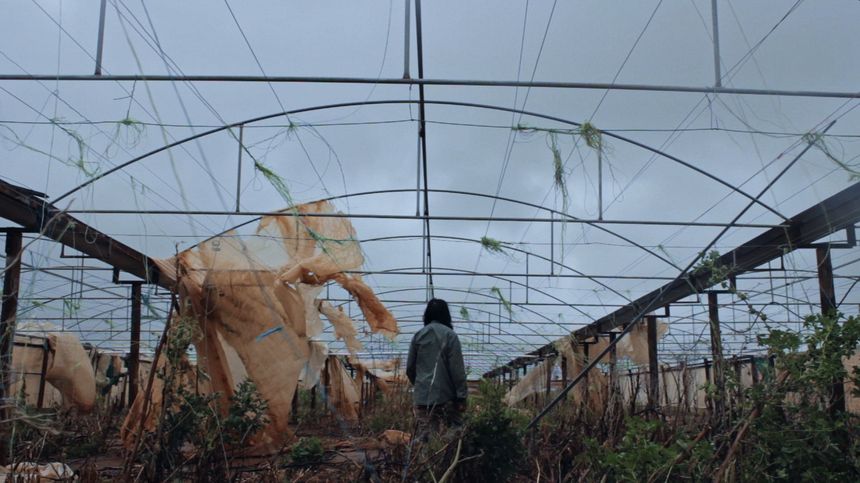Melbourne 2020 Review: Allison Chhorn's THE PLASTIC HOUSE, Experimental Meditations of Loss and Loneliness
This personal docufiction hybrid hypnotizes and lingers with it's unique sense of displacement and routine

There are no specifics on the where or when of it, and yet Director Allison Chhorn’s personal doco-fiction hybrid film The Plastic House remains confident of its place. The Plastic House is a quiet ode to an immigrant family-owned farming operation in rural South Australia. It is a wordless existential angst and stasis over the perceived death of family. It is the isolation of ethnicity. Background on the film is readily available, but not necessary to understand that which is relayed in dream-like snippets throughout that touch on the aforementioned themes.
Slow-burning images of abrasion and grime that feel more like an art installation give way to a solitary unnamed worker. This already feels like a tale about loss, and as if in mourning the isolated protagonist bows her head, diligently working wordlessly across seasons as the produce and its cycle are affected by the elements. These are long artfully composed shots, but even without the inherent drama there is a despair felt here. What remains unsaid, and why are questions pondered as the heightened sound recordings accompany the lonely task of cultivation on a family-less farm.
Transient noise of traffic and distant flights fill the often-times grainy and close-up shots in The Plastic House. The drone of Agri-business hums with industrial sound that recalls a feeling of dread or displacement. Scenes focus on different aspects of the plastic house, a large minimalist white plastic tarp covered structure, where green vegetables are harvested non-linearly from seed to bag. The film does alot with so little.
In a meditative yet discomforting manner, time skips ahead. The weather hints at the season, the physical status of the space she inhabits morphs around her and the artful sound design continues to border on the blissful and the disruptive. Her wordless sometimes soundless despair is conveyed from the windshield of driving aimlessly in the overcast weather, and listening joylessly to a stack of plastic covered media in her bedroom. Melancholy pervades both interior and exterior.
Watching recordings on a camera screen of her family at work in the same space, like a film by Apichatpong Weerasethakul (Uncle Boonmee Who Can Recall His Past Lives) they are haunting this physical space across time as unseen forces. The semi-distorted cam footage of her parents at work gives a later scene a powerful quality, and there is an ethereal sense to the weather, the warped, ripped windswept plastic that covers the house, and the shadows that linger, and move, seemingly floating above it.
The Plastic House is a mood piece; a statement of loneliness and death through lifeless repetition and routine, there is a quote from Faulkner (because why not) that is boldly presented, breaking the convention, but it aptly describes the apparition that may well be the protagonist. She reaches for the book, metaphorically lays dying as she, and we, read a passage from “As I lay dying”.
The final shot is an ominous conclusion to this rote grief, allowing time to recall the mindset of the protagonist, and the meaning of the stark destination she trails off to, was this intended all along? The Plastic House, described as budget-less still achieves its personal ruminations, with a severe quietness this experimental film is paradoxically distressing, calming and wholly unique.
The Plastic House is screening as part of the online-only MIFF 68-and-a-half, book now to avoid missing out. The digital streaming festival runs from 6-23rd August Australia-wide.







